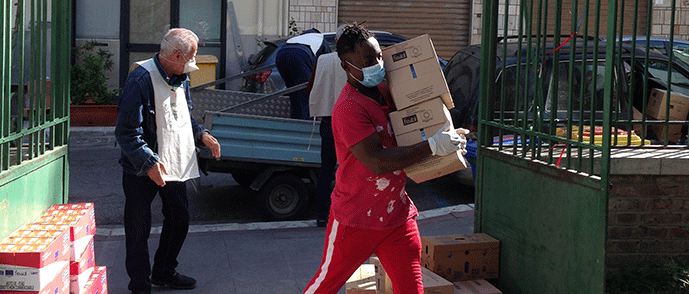Guadalajara, May 21, 2020 – The Covid-19 pandemic has literally paralyzed the world. Although on different dates most of the countries of the world decreed radical measures to stop its expansion. The measures basically consisted of extreme hygiene standards, confining as much of the population as possible to their homes, and suspending non-essential activities. As a consequence of these preventive actions, practically the world’s economic activity was suspended. Now, the different countries of the world slowly, at different dates, will begin to emerge from “quarantine.” We are slowly getting used to a “new normal.” Both during quarantine and during the economic recovery in some countries, the role of migrants has been and will be fundamental.
In American cities like New York and Los Angeles, the service provided by people who deliver food on their bicycles, many of them irregular migrants, became essential. Other essential services provided by migrants, which were previously invisible, the pandemic made them visible. Migrant workers working on caring for the sick, producing and storing groceries, delivering goods, cleaning streets, and public spaces in cities. All of these workers, who were considered “untrained” risked their lives during the pandemic to care for the infected, keep those who were quarantined alive at home, and also to keep their jobs and provide for their families.
In Italy, recently, Prime Minister Giuseppe Conte approved a decree that includes a package of measures for 55 billion euros to re-launch the economy and face the economic emergency caused by the coronavirus. Among the measures, the regularization of thousands of non-EU (non-European) migrants who irregularly entered Italy to work clandestinely in the countryside and in domestic service to cope with the lack of labor caused by the closure of borders during the pandemic stands out.
Every year approximately 350,000 seasonal workers, mainly from Eastern Europe, collect the fruits and vegetables produced in the Italian countryside. However, due to the closing of borders in Europe around 250,000 workers would be needed so that the harvest is not lost and the products can reach supermarkets. It is currently estimated that 600,000 undocumented migrants live in Italy, whom they call “the invisible ones.” These “Invisibles” will be less invisible and could become the solution for the lack of labor in the agricultural sector.
It is planned to grant a work permit for six months to work in the agricultural and domestic sectors, renewable for another six months. The requirement is that applicants for this permit have an expired residence permit or that they have never had a residence permit and that they have not committed crimes in the last five years. It is estimated that 250,000 migrants are irregular or “undocumented.” It is not the first time that Italy has carried out an immigration regularization. As the prime minister recalled when giving the announcement, in the history of the Republic there have been eight migratory regularizations, regardless of the ideology of the parties in power.
Regularizing migrants is also a way of protecting men and women who work in the agriculture sector in conditions of slavery since it gives the possibility of making transparent a situation that was in the hands of criminals. The amount of mafia operations in agriculture is estimated to be more than 25 billion euros. The regularization of migrants is also a way to decrease the mafias’ businesses.
This process of labor integration before the pandemic would have been impossible. Just a few months ago, the anti-immigration discourse maintained the popularity of the Northern League, a far-right party led by Matteo Salvini. This measure represents a social opening that defies the electoral logic of recent times in Italy. Definitively, this regularization in another context would have been impossible due to the political costs that would have been involved.
Unintentionally, the crisis caused by the COVID-19 pandemic has made visible how essential the work of migrants is for the societies they reach. Without anyone imagining it, both in the United States and in Italy, the work they do and the contribution they make to the communities in which they establish have been revalued, even though they sometimes remain clandestine and subjected to harassment.
In contrast, in Mexico, migration continues to be perceived as a “social problem” that the State is responsible for managing. Migrants have been made invisible during the pandemic. On the northern border, Mexican migrants continue to be deported without sanitary controls and without programs that allow them to be integrated into the country’s social, economic, and cultural life. Central American migrants who were detained at immigration stations before the pandemic were deported due to the inability to guarantee their rights and manage the crisis in another way. It would seem to be reaffirming that the only way the Mexican government can manage irregular migration flows is through deportation. Hopefully, the example of appreciation of migrants and appreciation of their contributions to the societies they reach will also allow us to rethink a “new normal” in our relationship with migrants.
José Juan Cervantes, c.s.
Consulted sources:
https://www.theguardian.com/…/immigrants-are-essential-coro…
Idem
https://www.infobae.com/…/coronavirus-y-falta-de-trabajado…/
https://www.lanacion.com.ar/…/coronavirus-conte-regularizo-…
https://elpais.com/…/una-regularizacion-masiva-de-inmigrant…


